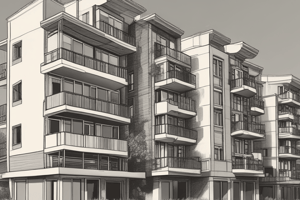Podcast
Questions and Answers
What is sponsor turnover?
What is sponsor turnover?
Sponsor turnover refers to the point at which the sponsor has to give up control of the board, which occurs when either 50% of the units are sold or after five years.
What do CC&Rs stand for?
What do CC&Rs stand for?
- Common Areas and Rights
- Covenants, Conditions, and Restrictions (correct)
- Condominium Control and Regulations
- Community Choices and Rules
What is the purpose of testing the market?
What is the purpose of testing the market?
The purpose of testing the market is to ensure there is demand for the condo community before proceeding with sales.
What is the CPS-1 Application?
What is the CPS-1 Application?
A letter of intent is a binding agreement.
A letter of intent is a binding agreement.
What is typically required from buyers when purchasing a condo?
What is typically required from buyers when purchasing a condo?
What does a Certificate of Occupancy confirm?
What does a Certificate of Occupancy confirm?
What is flipping in real estate?
What is flipping in real estate?
What is a simultaneous closing?
What is a simultaneous closing?
The buyer typically needs to pay _______ costs when closing on a condo.
The buyer typically needs to pay _______ costs when closing on a condo.
All condo owners own the exterior of their unit.
All condo owners own the exterior of their unit.
Which type of insurance protects against title issues found after closing?
Which type of insurance protects against title issues found after closing?
What defines a condominium?
What defines a condominium?
What are maintenance fees?
What are maintenance fees?
Who is a sponsor in the context of condominiums?
Who is a sponsor in the context of condominiums?
What is a declaration in condominiums?
What is a declaration in condominiums?
What do the bylaws in a condominium govern?
What do the bylaws in a condominium govern?
The ____________ Act regulates condominium ownership in New York.
The ____________ Act regulates condominium ownership in New York.
What are common areas in a condominium?
What are common areas in a condominium?
Condo owners own the exterior of their units.
Condo owners own the exterior of their units.
What must condo owners obey according to the Condominium Act?
What must condo owners obey according to the Condominium Act?
What is the role of the board of directors in a condominium?
What is the role of the board of directors in a condominium?
Study Notes
Key Terms in Condominiums
- Condominium: Type of property where individual owners have separate interests in their units and shared ownership of common areas.
- Common Areas: Resources shared among residents, including land, amenities, and facilities such as pools and hallways.
- Maintenance Fees: Monthly costs paid by condo owners for maintaining common areas.
- Sponsor: Developer or owner responsible for creating and selling the condominium or cooperative property.
- Declaration: Legal document outlining the property's specifics, ownership units, common areas, and usage restrictions; known as the master deed.
- Offering Plan: Detailed document about the condominium provided by the sponsor, including property specifics and terms.
- Bylaws: Rules governing the condominium association's activities, including usage and regulations.
- CC&Rs (Covenants, Conditions, and Restrictions): Private rules ensuring consistency and aesthetic standards in the community.
- Flipping: Buying, renovating, and quickly reselling properties for profit; illegal flipping constitutes real estate fraud.
Understanding Condominiums
- Condominiums are increasingly popular among various demographics for affordability and reduced maintenance.
- Real estate agents specializing in condos can fill a knowledge gap in the market.
Ownership Structure
- Condo owners possess fee simple interest in their units, but only undivided interest in shared common areas.
- Owners do not own the exterior, land, or common areas like swimming pools or common hallways.
Limited Common Areas
- Limited common areas are shared but designated for use by specific owners, such as private parking spaces or terraces.
Legal Framework
- Horizontal Property Acts: State-specific laws that govern ownership structures in condominiums.
- Condominium Act: New York's adaptation of horizontal property acts, regulating condo governance and owner responsibilities.
Key Actors in Condominiums
- Homeowners Association (HOA): Comprised of all unit owners, responsible for common area maintenance and governance.
- Board of Directors: Elected body managing the condo’s operations; responsible for policies affecting communal living.
Conversion and Tenant Rights
- Condos can originate from new builds or conversions of rental properties; tenant rights are protected via noneviction and eviction plans.
- Noneviction Plan: Allows conversion if 15% of units are sold without eviction of current tenants.
- Eviction Plan: Requires agreement from 51% of tenants to purchase units if evictions occur.
Sponsor Responsibilities
- Sponsors are responsible for filing required documents with the attorney general, including articles of incorporation, offering plans, and bylaws.
Offerings and Pricing
- The Martin Act mandates comprehensive descriptions in offering plans, which must be approved before advertising.
- Sponsors can amend pricing in response to market changes, land costs, or demand.
Bylaw Governance
- Bylaws govern condo use, voting, and management transitions. Sponsors maintain control until a substantial portion of units are sold.
Market Testing
- Sponsors must submit a CPS-1 Application to gauge market demand before proceeding with further development or sale initiatives.### Advertising Regulations
- CPS-1 requires clear legends in ads to indicate they are advertisements, not offerings.
Letter of Intent (LOI)
- A non-binding agreement that indicates a buyer's intent to do business after market testing.
- Typically drafted by a broker and allows reservation of a specific unit.
- Offers credibility to sellers and shows lenders that a development is not a financial risk.
- Initial deposit secures the right of first refusal; buyer may terminate without penalty or proceed to a binding contract.
Financing the Condo
- Purchasing a condo involves a fee simple transaction, often requiring a loan.
- Lenders evaluate acceptable income sources, debt-to-income ratios (DTI), and loan-to-value ratios (LTV).
- High DTI indicates potential risk; high LTV signifies lower down payments and higher risk.
Default on Mortgage
- Mortgage default results in a lien against the property.
- Lender forecloses only on the defaulted unit without impacting other condominium owners.
Certificate of Occupancy (CO)
- Required by lenders post-inspection to certify legal occupancy and property layout.
- Two types: Temporary Certificate of Occupancy (TCO) and final CO; both must be "DOB certified".
- Ensures compliance with laws and resolution of all violations and fees.
Flipping Properties
- Refers to buying, refurbishing, and quickly reselling a property for profit.
- Illegal flipping is a form of real estate fraud; developers may restrict flipping to reduce market competition.
Simultaneous Closing
- Involves two transactions occurring concurrently: seller, buyer, and investor are involved.
- Seller creates a mortgage note that the investor purchases at closing; buyer then pays mortgage to the investor.
Property Closing Transactions
- Unit sales include interest in common areas.
- Title search resolves any claims or liens before closing.
Title Insurance
- Protects lenders and sometimes owners against title issues discovered post-closing.
Closing Disclosure
- Prepared by closing agents detailing the final transaction accounts and required by federal laws.
Closing Costs
- Both buyers and sellers incur various costs during closing.
Seller Closing Costs
- Common costs include attorney fees, managing fees, transfer taxes, and title fees.
Buyer Closing Costs
- Include attorney fees, appraisal costs, tax escrows, various insurances, recording fees, and possibly a mansion tax.
Sponsor Closing Costs
- Purchasers from sponsors typically pay transfer taxes and sponsor's legal fees.
Other Closing Issues
- Contracts may feature a right of first refusal clause allowing HOA first dibs on the unit if resold.
- Buyers can write off mortgage interest but not closing costs for tax purposes.
Condominiums vs. Residential Homes: Similarities
- Both follow similar closing transactions and tax laws, can be mortgaged, insured individually, and allow fee simple ownership.
Condominiums vs. Residential Homes: Differences
- Condo owners own only interior space whereas homeowners own the full property.
- Condo owners must adhere to bylaws and pay fees for common areas, unlike homeowners.
Recap of Condominiums
- Comprised of multiple residential units with unique ownership structures combining individual and co-ownership.
- Often converted from rentals or newly constructed by sponsors responsible for creating governing documentation.
- Owners are part of an HOA, led by a board potentially hiring a managing agent.
Studying That Suits You
Use AI to generate personalized quizzes and flashcards to suit your learning preferences.
Description
Test your knowledge on key terms related to condominiums in Chapter 1 of Level 19. This quiz includes definitions of essential concepts such as common areas and maintenance fees. Perfect for anyone studying real estate or property management.




